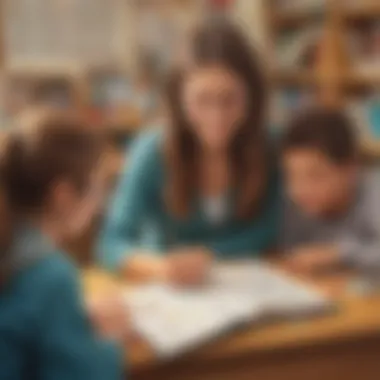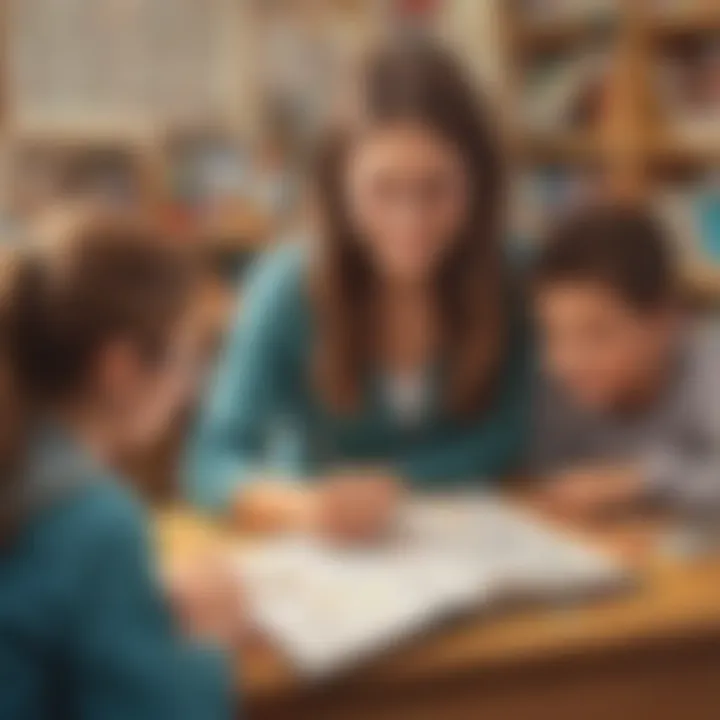Unlocking the Power of Spelling Games for High School Students


Creative Activities
When it comes to enhancing spelling skills for high schoolers, creative activities play a pivotal role in making learning both enjoyable and effective. By incorporating engaging craft ideas that are easy to replicate, students can immerse themselves in a hands-on learning experience. These craft activities are designed to stimulate creativity and reinforce spelling concepts through tactile engagement. Step-by-step guides accompany each activity, providing intricate instructions to assist students in executing the tasks with precision. Such activities not only offer an outlet for artistic expression but also contribute to developing a deeper understanding of spelling rules and patterns. The educational value of these creative endeavors lies in their ability to make learning memorable and interactive, fostering a dynamic approach to mastering spelling skills.
Fun Quizzes
Integrating fun quizzes into the learning process can significantly elevate high schoolers' spelling proficiency. Elem Fun features a diverse array of quiz topics tailored to challenge students on different aspects of spelling. From basic vocabulary assessments to complex word structure queries, these quizzes cater to various skill levels, ensuring an enriching experience for all participants. The question types employed in these quizzes vary, incorporating multiple choice, fill-in-the-blank, and word jumble formats among others, to engage students actively and foster critical thinking. Through consistent engagement with these quizzes, students can reinforce their spelling knowledge and retention, honing their accuracy and speed in word recognition. The quizzes serve as invaluable tools for self-assessment, empowering students to track their progress and pinpoint areas for improvement, thereby facilitating targeted learning experiences that optimize spelling skills.
Fact-Based Articles
Delving into fact-based articles is an enriching way for high schoolers to expand their spelling competency beyond traditional exercises. These articles cover a wide range of topics, from etymology to language evolution, presenting linguistic concepts in a compelling and accessible manner. Through engaging content enriched with anecdotes and real-life applications, students gain a comprehensive understanding of spelling nuances and linguistic patterns. Furthermore, these articles serve as supplementary resources, offering additional insights and exploring interconnected themes to broaden students' language horizons. By providing links to related articles and external resources, learners are encouraged to embark on self-directed exploration, fostering a curiosity-driven approach to spelling mastery. The blend of informative content and interactive learning opportunities makes fact-based articles a valuable asset in the quest for improving spelling skills among high schoolers.
Introduction
In the realm of high school education, the significance of spelling games cannot be overstated. Introducing innovative and engaging methods to enhance students' spelling skills can have a profound impact on their overall academic development. By infusing elements of fun and interactivity into learning, spelling games serve as more than just recreational activities; they become valuable tools for honing language proficiency.
Understanding the Importance of Spelling Games
Exploring the importance of spelling games unveils a myriad of benefits that extend beyond the surface level of improving spelling accuracy. These games not only aid in reinforcing correct spellings but also nurture a deeper understanding of language structure and phonetics. High schoolers engaging with spelling games are exposed to a diverse range of vocabulary, allowing them to expand their linguistic repertoire and develop a keen eye for detail. Furthermore, the cognitive demands of spelling games stimulate critical thinking skills, promoting mental agility and analytical prowess.
Target Audience for Spelling Games
High school students stand as the primary beneficiaries of spelling games, reaping the educational rewards while enjoying the interactive nature of these activities. Within this demographic, individuals at varying levels of spelling proficiency can find tailored challenges and opportunities for growth. By catering to the unique needs of high schoolers, spelling games cater to both struggling spellers seeking improvement and proficient individuals looking to refine their skills. The inclusivity of spelling games ensures that all students, regardless of their starting point, can experience the enriching effects of linguistic mastery.
Benefits of Spelling Games


When exploring the realm of spelling games for high schoolers, it becomes evident that the benefits extend far beyond mere orthographic accuracy. These games serve as powerful tools to enhance various cognitive skills, foster linguistic development, and stimulate memory retention. By engaging in spelling games, students not only bolster their vocabulary but also sharpen their cognitive abilities and fortify their capacity to retain information. The multifaceted advantages of spelling games make them indispensable in the educational journey of high school students.
Improvement in Vocabulary
One of the primary advantages of spelling games is their unparalleled efficacy in improving vocabulary. Through consistent exposure to a diverse range of words in a playful and interactive setting, high schoolers can expand their lexicon and grasp nuances in language. Spelling games challenge students to not only spell words correctly but also understand their meanings and contextual usage. This dual emphasis on spelling accuracy and semantic comprehension contributes significantly to the enhancement of students' overall linguistic proficiency.
Enhancement of Cognitive Skills
Beyond vocabulary enrichment, spelling games play a pivotal role in enhancing cognitive skills among high schoolers. These games require active engagement, critical thinking, and problem-solving abilities, thereby helping students sharpen their mental acuity. By navigating through word puzzles, deciphering anagrams, and strategizing in spelling competitions, individuals develop essential cognitive faculties such as focus, logic, and analytical reasoning. The intellectual stimulus provided by spelling games cultivates a resilient cognitive framework in students, preparing them to tackle academic challenges with heightened cognitive dexterity.
Boosting Memory Retention
Memory retention is a crucial facet of academic success, and spelling games offer a dynamic approach to fortifying this cognitive function. Through repetitive exposure to words, reinforcement of spelling patterns, and retrieval practice inherent in spelling games, high schoolers experience a notable improvement in their memory retention capabilities. The interactive nature of these games creates memorable learning experiences, utilizing mnemonic devices, visual cues, and auditory reinforcement to solidify spelling patterns in students' long-term memory. By enhancing memory retention, spelling games equip students with an enduring foundation of linguistic knowledge that facilitates effective communication and academic proficiency.
Types of Spelling Games
In this article, we delve into the significant role that different types of spelling games play in enhancing high school students' language proficiency. Examining various spelling games becomes vital as it exposes learners to diverse methods that cater to their individual learning styles. By encompassing a range of game variations, we ensure that students with varying interests and preferences can find engaging and effective ways to boost their spelling skills.
Word Puzzles and Crosswords
Word puzzles and crosswords serve as classic yet effective tools for high schoolers to expand their vocabulary and enhance spelling accuracy. These games challenge students to decipher and spell words correctly within a specific context, promoting linguistic agility and critical thinking skills. By engaging with word puzzles and crosswords, students not only improve their spelling competencies but also strengthen their problem-solving abilities.
Spelling Bee Competitions
Spelling bee competitions offer a competitive and engaging platform for high school students to showcase their spelling prowess. These events stimulate students' motivation to excel in spelling through friendly competition, fostering a conducive environment for peer learning and healthy academic rivalry. Participating in spelling bee competitions empowers students to expand their word bank, enhance spelling accuracy, and build confidence in public speaking.


Interactive Online Platforms
Interactive online platforms revolutionize the way high schoolers engage with spelling games, providing a dynamic and personalized learning experience. Through gamified interfaces and interactive exercises, students can immerse themselves in a virtual world of spelling challenges tailored to their proficiency level. Online platforms offer instant feedback, track progress, and adapt difficulty levels, optimizing the learning journey and reinforcing spelling skills effectively.
Engaging Strategies in Spelling Games
In the domain of spelling games for high schoolers, the section on Engaging Strategies plays a crucial role in ensuring effective learning outcomes. These strategies are meticulously designed to capture students' attention, foster active participation, and enhance retention of spelling concepts. By imbuing the learning process with elements of engagement, educators can create a dynamic and stimulating environment that motivates students to improve their spelling proficiency. The high school years are a critical period for mastering language skills, and employing Engaging Strategies in spelling games can significantly contribute to students' linguistic development.
Gamification Techniques
Gamification Techniques within spelling games introduce elements of competition, rewards, and progress tracking to make learning enjoyable and interactive for high schoolers. By integrating game-like features such as points, levels, and challenges, educators can transform conventional spelling exercises into engaging activities that inspire student interest and persistence. Gamification not only incentivizes participation but also reinforces learning through immediate feedback and positive reinforcement. High school students are particularly receptive to these techniques due to their affinity for digital platforms and competitive settings, making gamification a potent tool in enhancing spelling skills within this age group.
Collaborative Learning Approaches
Collaborative Learning Approaches in spelling games emphasize teamwork, peer interaction, and shared problem-solving among high school students. By encouraging individuals to collaborate on spelling tasks, educators can promote a sense of social connection, communication skills, and collective achievement. Collaborative learning not only enhances spelling abilities but also nurtures important interpersonal skills that are vital for academic and personal growth. High schoolers benefit significantly from engaging in collaborative activities as they offer diverse perspectives, mutual support, and a sense of camaraderie that motivates active participation and fosters a cooperative learning environment.
Incorporating Technology for Engagement
Incorporating Technology for Engagement in spelling games involves leveraging digital tools, interactive media, and online platforms to enhance the learning experience for high school students. By utilizing technology, educators can create immersive and customizable learning environments that cater to individual learning styles and preferences. From interactive quizzes to virtual reality simulations, technology-enabled spelling games provide high schoolers with novel ways to engage with language content, practice spelling skills, and receive instant feedback. Integrating technology not only adds a contemporary flair to traditional spelling exercises but also enriches the educational experience by broadening access to diverse resources and fostering digital literacy skills among students.
Challenges and Solutions
In the intricate landscape of spelling games for high schoolers, tackling challenges and devising effective solutions play a crucial role in enhancing the learning experience. High school students often face various hurdles when it comes to spelling, be it complex words, homophones, or uncommon vocabulary. Addressing these spelling difficulties head-on is key to fostering a strong foundation in language skills. By acknowledging and understanding the specific pain points learners encounter, educators and parents can tailor interventions to meet individual needs and promote a positive learning environment.
Addressing Spelling Difficulties


When delving into addressing spelling difficulties among high school students, it's essential to approach this aspect with strategic methodologies. Recognizing common areas of struggle, such as phonetic inconsistencies and irregular spellings, allows for targeted interventions to be implemented. By providing tailored exercises focusing on problem areas, students can gradually overcome hurdles and improve their spelling accuracy. Additionally, utilizing mnemonic devices and word association techniques can aid in cementing knowledge retention, making learning a more engaging and fruitful process.
Tailoring Games for Individual Needs
Customizing spelling games to suit the individual needs of high school students is a fundamental aspect of optimizing the learning experience. Every student possesses unique learning styles and strengths, necessitating personalized approaches to cater to their specific requirements. By incorporating adaptive learning techniques, educators can ensure that spelling games are challenging yet attainable for each student. This tailored approach not only boosts confidence but also fosters a sense of accomplishment, motivating students to further enhance their spelling skills and vocabulary.
Creating Varied Difficulty Levels
In the realm of spelling games tailored for high schoolers, offering a range of difficulty levels is paramount to accommodating learners of diverse proficiency levels. By providing varying degrees of complexity in word selection, phonetic challenges, and linguistic nuances, students are presented with opportunities for both growth and consolidation of existing skills. Gradually increasing the difficulty level allows for continuous progression and ensures that students are consistently stimulated and challenged. This approach not only enhances the learning experience but also cultivates a sense of resilience and determination in students, instilling valuable skills beyond spelling proficiency.
Practical Applications in High School Settings
Exploring practical applications of spelling games in the high school environment is crucial for enhancing students' language skills. Integrating spelling games into the curriculum serves as a dynamic method to engage students actively in learning. By introducing spelling activities in various subjects, such as English language classes or even science and history lessons, educators can provide a holistic approach to skill development and knowledge retention. These applications not only improve spelling but also boost critical thinking and problem-solving abilities.
Integration into Curriculum
One significant aspect of practical application in high school settings is the seamless integration of spelling games into the existing curriculum. By infusing spelling challenges into daily lesson plans, teachers can create a stimulating learning environment that caters to different learning styles. Interactive spelling tasks can reinforce vocabulary and grammar concepts taught in class, fostering a deeper understanding of the language. Moreover, integrating spelling games into the curriculum promotes student engagement and participation, making learning more enjoyable and impactful.
Extracurricular Spelling Clubs
In addition to in-class integration, extracurricular spelling clubs offer high schoolers an avenue to further enhance their spelling skills. These clubs provide a supportive space for students to practice and improve their spelling in a non-academic setting. Participating in spelling bees and competitions within the club not only hones students' spelling abilities but also cultivates a sense of camaraderie and friendly competition among peers. Extracurricular spelling clubs play a vital role in boosting students' confidence and motivation towards mastering spelling, creating a well-rounded educational experience.
Parental Involvement and Support
Parental involvement and support are integral components of a successful spelling learning journey for high schoolers. Encouraging parents to engage in spelling activities at home, such as playing word games or conducting spelling quizzes, reinforces what students learn in school. Parental involvement not only reinforces spelling skills but also strengthens the bond between parents and their children through collaborative learning experiences. By fostering a supportive learning environment both at school and at home, parents become valuable partners in their children's spelling education, contributing to long-term academic success.
Conclusion
In the realm of high school education, the significance of spelling games cannot be overstated. As high school students navigate through a myriad of academic challenges, developing a strong command of spelling not only enhances their written communication but also nurtures a crucial aspect of linguistic proficiency. Through the comprehensive exploration of various spellings games, this article aims to shed light on the transformative impact these games can have on high schoolers. By delving into interactive exercises and digital platforms, students are poised to embark on a journey of enriching their spelling abilities in innovative and engaging ways. The practical applications of spelling games can foster a culture of learning that extends beyond mere memorization, paving the way for a deeper understanding and appreciation of language.
Empowering High Schoolers Through Spelling Games
Empowering high schoolers through spelling games instills a sense of motivation and excitement in their educational journey. By utilizing gamification techniques, educators can create immersive learning experiences that captivate students' attention and spark their curiosity. Collaborative learning approaches offer opportunities for students to learn from their peers, fostering a supportive and interactive environment that enhances their spelling skills. Incorporating technology further elevates the engagement level, making learning not only effective but also enjoyable for high schoolers. Through these strategies, students are empowered to take ownership of their learning, cultivate resilience in overcoming spelling challenges, and build confidence in their linguistic abilities. Empowering high schoolers through spelling games transcends traditional teaching methods, offering a dynamic and enriching approach to language acquisition that resonates with students' innate curiosity and creativity.







